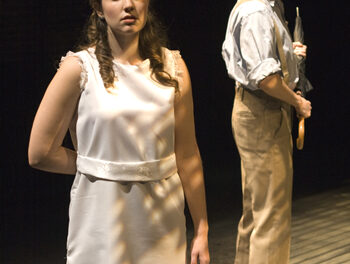The Carolina Theatre of Durham continued the programming of its 80th season by presenting a dance company touted as “the hottest thing in L.A.” in Fletcher Hall on January 20 — but the heat didn’t make it from the West Coast with the Lula Washington Dance Theatre. Perhaps the company was a little tired from its community residency, but even in the best pieces they didn’t really sizzle.
The program opened with “African Ukumbusho,” choreographed by Lula Washington in 2002. The title translates as “African Memories,” and the piece comprises several illustrative segments tenuously connected by spoken texts riddled with clichés and assumptions of audience ignorance. Although there were some nice costuming and lighting effects, there was remarkably little to look at in terms of dance. The “Men Boot Dance” segment was especially weak — throughout its wan execution I was wishing for Stafford Berry, Jr., of the African-American Dance Ensemble to leap from the audience onto the stage and show the LWDT how the thing is done.
The crux of the problem with “African Ukumbusho” is that it is not really a piece of artwork but an attempt at forcing an abstract art form to act verbally, as a cultural lesson, a teaching tool. Art can certainly give us lessons, but only if that has not been the prime object of the artist. This truth was brought into sharper focus by the closing work on the program, Donald McKayle’s 1972 “Songs of the Disinherited,” which, although it had a similar segmented structure, was devoid of cliché and shallow sentiment and absolutely did not hector the audience. Instead, the choreography and the beautiful dancing led us into deep pools of feeling, where we could wash at will in the waters of understanding. Especially lovely was the “Angelitos Negros” section, danced by the ravishing Orialis Serrano (last seen in the Triangle as a member of the Cleo Parker Robinson Dance Ensemble, riveting the audience at the Hayti Heritage Center in 2005).
There were other fine dances on the program, but none of them were choreographed by Lula Washington. McKayle’s recent “I’ve Known Rivers,” based on the famous Langston Hughes poem “The Negro Speaks of Rivers” and set to music by Margaret Bonds, is an outstanding work for solo dancer, here the sinuous Ramon Thielen, whose background in ballet and familiarity with the Balanchine oeuvre were clearly assets in interpreting movements both flowing and angular.
Tamica Washington-Miller, the company’s associate director, produced a jaunty “Thanks and Praises,” set to swinging jazz by Jimmy Smith. This happy dance is replete with lifts, turns, and floor work, as is the sensuous “Pas de Deux for Noel Pointer,” choreographed by Louis Johnson. As danced by Rocklin Thompson and April Thomas Wilkins, it demonstrated that the LWDT can get some chemistry going when it tries.
Anyone who can start a dance company in the face of the kind of odds Lula Washington had to work with – and who can keep it going for 25 years – deserves our praise and admiration. But perhaps the time has come for Washington to step back and guide her company in the work of other choreographers. The evening’s other two dances, both by Lula Washington, one of which was supposed to be the highlight of the program, were the worst things I’ve ever seen on the professional dance stage.
The dancers did their best with them, but what can you do with a series of calisthenics, or a simplistic skit? “For Those Who Live and Die for Us… A Tribute to the American Soldiers,” no matter what one may think of its “content,” hardly even qualifies as a dance, as all the “dancers” do is move in boxy drill-like formations (without even the elegance of those rigid exercises) and emit ugly sounds. “The Movement” (2006) was, again, less of a dance than an attempt at a history lesson suitable for young children not yet ready for complex thought or ambiguity. Its entire aesthetic value lay in Dr. Martin Luther King, Jr.’s recorded oratory. If the excerpts Washington chose had included some of King’s anti-war speeches, one could have perhaps interpreted the soldier piece differently — as ironic, or even sardonic. But we were apparently to take both pieces straight. And the one, taken straight, is jingoistic, and the other — dare I say it? — is a whitewash.











